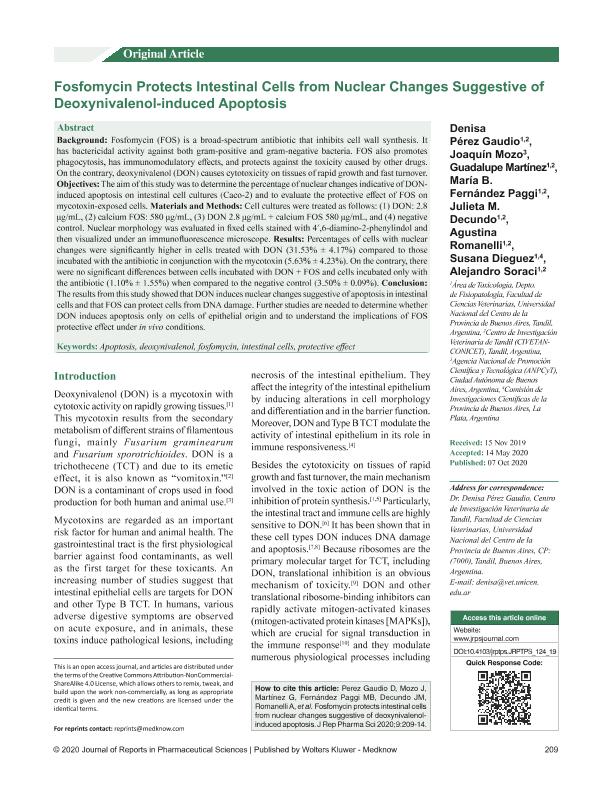Artículo
Fosfomycin protects intestinal cells from nuclear changes suggestive of deoxynivalenol-induced apoptosis
Pérez, Denisa Soledad ; Mozo, Joaquín; Martínez, Guadalupe
; Mozo, Joaquín; Martínez, Guadalupe ; Fernández Paggi, María Belén
; Fernández Paggi, María Belén ; Decundo, Julieta María
; Decundo, Julieta María ; Romanelli, Agustina
; Romanelli, Agustina ; Dieguez, Susana Nelly; Soraci, Alejandro Luis
; Dieguez, Susana Nelly; Soraci, Alejandro Luis
 ; Mozo, Joaquín; Martínez, Guadalupe
; Mozo, Joaquín; Martínez, Guadalupe ; Fernández Paggi, María Belén
; Fernández Paggi, María Belén ; Decundo, Julieta María
; Decundo, Julieta María ; Romanelli, Agustina
; Romanelli, Agustina ; Dieguez, Susana Nelly; Soraci, Alejandro Luis
; Dieguez, Susana Nelly; Soraci, Alejandro Luis
Fecha de publicación:
10/2020
Editorial:
Wolters Kluwer Medknow Publications
Revista:
Journal of Reports in Pharmaceutical Sciences
ISSN:
2322-1232
e-ISSN:
2322-5106
Idioma:
Inglés
Tipo de recurso:
Artículo publicado
Clasificación temática:
Resumen
Background: Fosfomycin (FOS) is a broad-spectrum antibiotic that inhibits cell wall synthesis. It has bactericidal activity against both gram-positive and gram-negative bacteria. FOS also promotes phagocytosis, has immunomodulatory effects, and protects against the toxicity caused by other drugs. On the contrary, deoxynivalenol (DON) causes cytotoxicity on tissues of rapid growth and fast turnover. Objectives: The aim of this study was to determine the percentage of nuclear changes indicative of DON-induced apoptosis on intestinal cell cultures (Caco-2) and to evaluate the protective effect of FOS on mycotoxin-exposed cells. Materials and Methods: Cell cultures were treated as follows: (1) DON: 2.8 µg/mL, (2) calcium FOS: 580 µg/mL, (3) DON 2.8 µg/mL + calcium FOS 580 µg/mL, and (4) negative control. Nuclear morphology was evaluated in fixed cells stained with 4′,6-diamino-2-phenylindol and then visualized under an immunofluorescence microscope. Results: Percentages of cells with nuclear changes were significantly higher in cells treated with DON (31.53% ± 4.17%) compared to those incubated with the antibiotic in conjunction with the mycotoxin (5.63% ± 4.23%). On the contrary, there were no significant differences between cells incubated with DON + FOS and cells incubated only with the antibiotic (1.10% ± 1.55%) when compared to the negative control (3.50% ± 0.09%). Conclusion: The results from this study showed that DON induces nuclear changes suggestive of apoptosis in intestinal cells and that FOS can protect cells from DNA damage. Further studies are needed to determine whether DON induces apoptosis only on cells of epithelial origin and to understand the implications of FOS protective effect under in vivo conditions.
Palabras clave:
APOPTOSIS
,
DEOXYNIVALENOL
,
FOSFOMYCIN
,
INTESTINAL CELLS
,
PROTECTIVE EFFECT
Archivos asociados
Licencia
Identificadores
Colecciones
Articulos(CIVETAN)
Articulos de CENTRO DE INVESTIGACION VETERINARIA DE TANDIL
Articulos de CENTRO DE INVESTIGACION VETERINARIA DE TANDIL
Citación
Pérez, Denisa Soledad; Mozo, Joaquín; Martínez, Guadalupe; Fernández Paggi, María Belén; Decundo, Julieta María; et al.; Fosfomycin protects intestinal cells from nuclear changes suggestive of deoxynivalenol-induced apoptosis; Wolters Kluwer Medknow Publications; Journal of Reports in Pharmaceutical Sciences; 9; 2; 10-2020; 209-214
Compartir
Altmétricas



